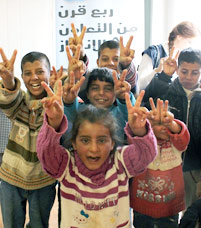 More than 40% of Syrian refugees in Jordan are children below the age of 11 (source: UNHCR). Photo: WHO16 June 2013 – Zeina* and her twin sister fled Syria to Jordan almost five months ago with their six children, all under the age of 11. “In Dar’aa, my home town, there was nothing. Our hospitals and health centres were almost all closed down. Doctors would come out to see people, but this was expensive, and I heard stories of doctors being kidnapped on their rounds,” she said. Despite the harsh living conditions in Al Zaatari camp, Zeina knows her children’s health comes first. “I don’t like it, but at least we can sleep at night. It takes us an hour to get from our tent to the immunization caravan, but I know it’s for the children’s good. They have begun to smile again since we left Syria. At least they get some medical assistance here.”
More than 40% of Syrian refugees in Jordan are children below the age of 11 (source: UNHCR). Photo: WHO16 June 2013 – Zeina* and her twin sister fled Syria to Jordan almost five months ago with their six children, all under the age of 11. “In Dar’aa, my home town, there was nothing. Our hospitals and health centres were almost all closed down. Doctors would come out to see people, but this was expensive, and I heard stories of doctors being kidnapped on their rounds,” she said. Despite the harsh living conditions in Al Zaatari camp, Zeina knows her children’s health comes first. “I don’t like it, but at least we can sleep at night. It takes us an hour to get from our tent to the immunization caravan, but I know it’s for the children’s good. They have begun to smile again since we left Syria. At least they get some medical assistance here.”
Zeina is just one of almost half a million Syrians refugees currently living in Jordan, joined daily by more than 1000 additional new arrivals. As the situation inside Syria continues to deteriorate, UNHCR estimates the total number of Syrians in Jordan will exceed 1 million before the end of this year, constituting almost 17% of Jordan’s total population.
“Despite its own socioeconomic challenges, Jordan continues to adhere to an open door policy, and provides a number of services to all Syrians fleeing the violence. However, this massive influx is severely straining the country’s limited economic and social resources,” said Dr Akram Eltom, WHO’s Representative in Jordan." Without additional support, Jordan’s capacity to provide these critical services to Syrians may soon be exhausted.”
While health services are readily available to Syrians living in refugee camps, such as Zeina and her family, almost 70% of all Syrians in Jordan live in urban communities, placing a significant burden on the country’s health system. According to the Jordanian Ministry of Health, the number of Syrians in Jordan’s public hospitals has increased dramatically by almost 250%, from 4109 patients in January 2013 to 10 330 patients in March 2013. The number of Syrians requiring surgical operations outside the refugee camps increased significantly by almost 600%, from 105 patients in January 2013 to 622 patients in March 2013.
Syrians with chronic diseases, who require more expensive, long-term treatment, have also placed an additional burden on Jordan’s health system. Based on current patient figures, the Ministry of Health estimates that by the end of 2013, there will be 676 Syrian cancer patients in Jordan, representing a 14% increase in Jordan’s total cancer disease burden.
Despite this pressure on Jordan’s health system, there has been insufficient investment of resources by the international community, resulting in shortages in hospital beds, nursing staff and chronic disease medicines. Some Jordanian patients are being turned away from elective surgery appointments due to the overloaded staff in hospitals who have to deal with war injuries and other emergencies among the Syrians crossing into Jordan.
Speaking to the international donor community in Geneva in May, H.E. Dr Mujalli Mhailan, Jordan’s Minister of Health and Minister of Environment, said that while the Government of Jordan had spent a total of US$ 52.65 million on health care for Syrian refugees as of April 2013, it had only received US$ 4.97 million, mainly through the direct financial support of four United Nations agencies, including WHO.
“Jordan is committed to humanitarian aid for Syrian refugees, but we can no longer bear the financial impact of the Syrian refugee crisis alone,” said H.E. Dr. Mujalli Mhailan. “Jordan’s public health system is dangerously overstretched, and lack of funding for the health sector poses increasingly grave risks to health status and social stability. Jordan needs now, and in the coming years, significant support in the form of burden-sharing from the donor community to sustain its health services for Jordanians and Syrian refugees.”
Approximately US$ 135 million is needed by the Government of Jordan to enable it to continue providing health care services to Syrians over the next 12 months. An additional US$ 180 million is needed for the rapid expansion of existing health care facilities, particularly in the north of the country, to meet the increasing health needs of Syrians and host communities. The Ministry of Health has produced a strategic plan to guide all donors and partners in directing their health care assistance with the main aim of strengthening public facilities and avoiding parallel services.
On 7 June 2013, the United Nations launched a revised Regional Refugee Response Plan, which outlines funding requirements by six countries affected by the crisis. A total of US$ 154 731 984 has been requested for the health sector in Jordan, including almost US$ 67.5 million for the Government of Jordan and US$ 9.2 million for WHO.
*Not her real name








